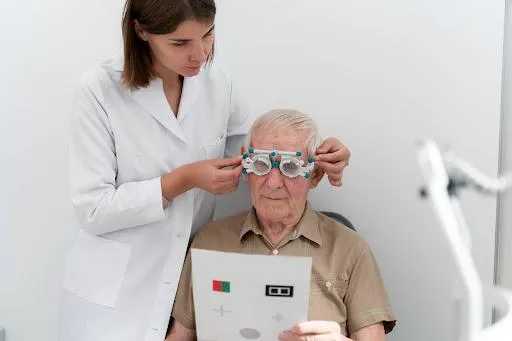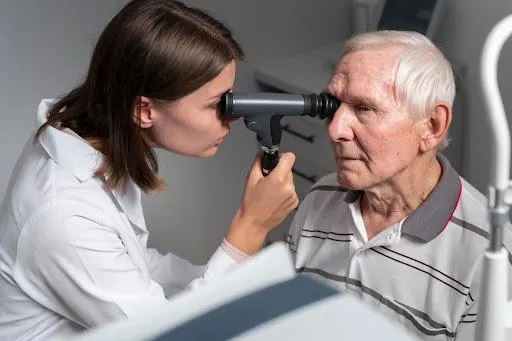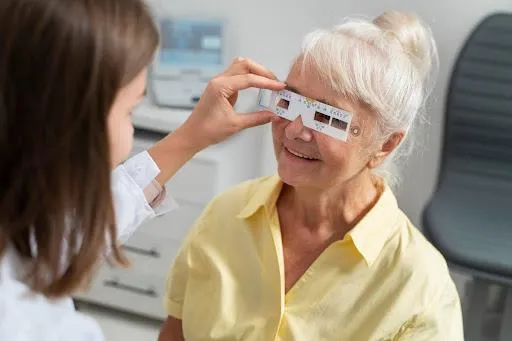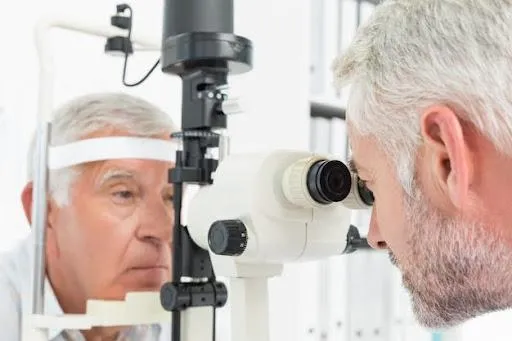Eye Health
Understanding and Managing Macular Degeneration
FSDAVCFEBFEVSDDVFSD
FSDAVCFEBFEVSDDVFSD
FSDAVCFEBFEVSDDVFSD
What AMD Really Means
Age-Related Macular Degeneration (AMD) is a progressive eye disease that affects the macula—the part of the retina responsible for sharp central vision. As it advances, AMD can cause blurriness, distortion, or dark spots in the center of your vision, making activities like reading or recognizing faces difficult.
There are two forms of AMD: dry and wet. Dry AMD is more common and progresses slowly as retinal cells thin and break down. Wet AMD is less common but more serious, involving abnormal blood vessels that leak fluid or blood into the retina, leading to faster vision loss. Early detection and treatment are crucial to preserving vision and quality of life.
Age-Related Macular Degeneration (AMD) is a progressive eye disease that affects the macula—the part of the retina responsible for sharp central vision. As it advances, AMD can cause blurriness, distortion, or dark spots in the center of your vision, making activities like reading or recognizing faces difficult.

There are two forms of AMD: dry and wet. Dry AMD is more common and progresses slowly as retinal cells thin and break down. Wet AMD is less common but more serious, involving abnormal blood vessels that leak fluid or blood into the retina, leading to faster vision loss. Early detection and treatment are crucial to preserving vision and quality of life.

Risk Factors and Prevention of AMD
AMD primarily affects adults over 60, but age isn’t the only contributing factor. Genetics, smoking, poor diet, and excessive sun exposure can all increase your risk. People with a family history of macular degeneration should be especially cautious, as hereditary traits may predispose them to retinal damage. Early awareness and understanding of these risk factors can lead to better prevention and early intervention.
Making healthy lifestyle choices can significantly lower your risk. Quitting smoking, maintaining healthy cholesterol and blood pressure levels, and protecting your eyes from UV rays are all beneficial. Wearing sunglasses outdoors helps reduce long-term sun damage. A nutrient-rich diet that includes leafy greens, fish, and colorful fruits also supports retinal health and overall eye function.
Certain nutrients—such as lutein, zeaxanthin, vitamin C, and zinc—play a key role in slowing AMD progression. These are often included in specialized eye vitamins, with the AREDS2 formula commonly recommended for individuals with moderate AMD. While these supplements won’t cure the disease, they may help preserve remaining vision. Preventive care begins with regular eye exams and staying informed about your eye health.
Role of Regular Eye Exams

Because AMD develops gradually, early symptoms can be easy to overlook. Blurry spots in your central vision, needing more light to read, or difficulty recognizing faces might seem like normal signs of aging but could indicate early macular changes. These subtle shifts in vision are important to recognize early, as timely intervention can help protect long-term eye health and prevent serious vision loss.
Routine comprehensive eye exams are essential for early detection of Age-Related Macular Degeneration.

Seniors, especially those with risk factors such as family history, smoking, or poor nutrition, should schedule yearly eye exams to closely monitor retinal health. Detecting AMD early allows patients to access effective tools and strategies that may slow the condition’s progression. With the right care—like nutritional support, protective habits, and regular monitoring—many individuals can maintain useful vision and preserve their independence as they age.
Optometrists in Spring TX rely on advanced retinal imaging and vision testing to identify subtle signs of AMD before noticeable vision loss occurs. Tools like Optical Coherence Tomography (OCT) allow them to capture detailed images of the retina’s layers, making it possible to detect early damage that might otherwise go unnoticed. These technologies play a critical role in diagnosing Age-Related Macular Degeneration at its earliest stages, giving patients a better chance of preserving their vision.
Once AMD is diagnosed, your optometrist carefully tracks its progression over time. They adjust your care plan as needed and may refer you to a retinal specialist if the condition becomes more advanced. Having a trusted provider monitor your eye health ensures that even the smallest changes are addressed early. This proactive approach is key to slowing AMD progression and protecting your quality of life through consistent, expert care and personalized attention to your unique vision needs.
Available Tools and Treatments for AMD
While there’s no cure for AMD, modern medicine offers effective ways to manage the condition. For dry AMD, the AREDS2 supplement formula is often recommended to help reduce the risk of progression. Patients are also advised to make dietary changes rich in antioxidants and protect their eyes from further strain by wearing UV-blocking sunglasses and maintaining healthy lifestyle habits.
In cases of wet AMD, specialists may recommend anti-VEGF injections. These injections work by blocking the growth of abnormal, leaky blood vessels in the retina, which are responsible for faster vision loss. Administered on a regular schedule, anti-VEGF treatments can help stabilize vision and, in some cases, even improve it. Early diagnosis and treatment are essential to managing AMD and preserving vision as effectively as possible.
How Kleinwood Vision Supports You
At Kleinwood Vision, early detection and personalized care are top priorities. Using advanced tools like OCT imaging, visual acuity tests, and in-depth retinal exams, optometrists can identify macular changes before symptoms affect daily life. Regular monitoring helps patients stay ahead of AMD progression, ensuring timely intervention.
If AMD is diagnosed, the team offers education and support throughout the journey. For patients requiring specialized treatment, optometrists coordinate referrals to trusted retinal specialists, providing seamless continuity of care from diagnosis to treatment.
At Kleinwood Vision, early detection and personalized care are top priorities. Using advanced tools like OCT imaging, visual acuity tests, and in-depth retinal exams, optometrists can identify macular changes before symptoms affect daily life. Regular monitoring helps patients stay ahead of AMD progression, ensuring timely intervention.
If AMD is diagnosed, the team offers education and support throughout the journey. For patients requiring specialized treatment, optometrists coordinate referrals to trusted retinal specialists, providing seamless continuity of care from diagnosis to treatment.


Kleinwood Vision also guides patients on lifestyle improvements and nutritional counseling to support vision health, including information on supplements like AREDS2. Their low vision rehabilitation services assist those facing central vision loss, helping maintain independence and confidence in daily activities.
Hope Through Support and Action
Having AMD does not mean losing your vision completely. Many people with early to moderate AMD maintain usable sight with the right care and management. Regular check-ups with your eye doctor are crucial to monitor changes and adjust treatment plans as needed. A healthy diet rich in antioxidants, vitamins, and minerals supports retinal health, while avoiding harmful habits such as smoking can significantly slow the progression of AMD and protect your remaining vision. Staying proactive with your eye health can make a big difference in preserving sight.
Even those with more advanced stages of AMD can benefit from low vision tools and rehabilitation. Devices like magnifiers, improved lighting, and smart visual strategies allow individuals to continue performing daily activities and hobbies they enjoy. Optometrists play a vital role in helping patients adapt by recommending the right aids and teaching techniques that maximize remaining vision. This assistance supports independence and improves quality of life despite vision challenges.
Support from knowledgeable eye care providers is essential in managing AMD effectively. They offer education, guidance, and personalized care plans that empower patients to take control of their condition. Family and community resources also contribute significantly by providing emotional support and practical help to those affected by AMD, reducing the feeling of isolation and overwhelm.
You are not alone in this journey. With early diagnosis, consistent care, and access to modern tools and resources, there is real hope for preserving vision and maintaining a high quality of life. By working closely with your healthcare team and staying informed, you can manage AMD and protect your sight for years to come.
Knowing When to Seek Help
If you notice any changes in your central vision, such as blurriness, distortion, or trouble recognizing faces, it’s important not to delay an eye exam. These symptoms may indicate early AMD, and early detection is key to protecting your long-term vision. Prompt diagnosis allows for timely intervention and management.
Adults over 60, or those with risk factors like family history or smoking, should prioritize annual retina exams. Early detection provides the opportunity to start treatment plans that can slow the progression of AMD. Delaying exams can lead to missed chances for effective management and increased vision loss.

If you notice any changes in your central vision, such as blurriness, distortion, or trouble recognizing faces, it’s important not to delay an eye exam. These symptoms may indicate early AMD, and early detection is key to protecting your long-term vision. Prompt diagnosis allows for timely intervention and management.
Adults over 60, or those with risk factors like family history or smoking, should prioritize annual retina exams. Early detection provides the opportunity to start treatment plans that can slow the progression of AMD. Delaying exams can lead to missed chances for effective management and increased vision loss.
If you’re frequently on the move or prefer not to wear glasses, multifocal contacts offer more freedom and convenience. They provide clear vision at multiple distances without the need for switching glasses, making them ideal for active lifestyles.
Scheduling a comprehensive eye exam is the essential first step in safeguarding your central vision. If you or a loved one have concerns, contact us or reach out to your eye care provider about AMD screening and support. Taking action early offers the best chance to maintain vision and quality of life.
Vision Care You Can Trust
Macular degeneration can feel overwhelming, but with expert care and consistent follow-up, there’s a clear path forward. Staying informed about AMD, adopting healthy habits like a nutritious diet and avoiding smoking, and committing to regular eye exams are crucial steps in managing the condition. These actions can help slow the progression and protect your vision.
Whether you’re newly diagnosed or simply want to maintain your eye health, Kleinwood Vision offers the guidance, tools, and compassion you need. Their experienced team provides personalized care tailored to your unique needs, from early detection to ongoing management. Taking control of your vision care today is essential because your future sight depends on it. With the right support and proactive steps, you can preserve your quality of life and continue enjoying the activities you love despite macular degeneration.

Contact Info
Hours of Operation
Mon - Fri | 9:00 AM - 5:00 PM
Sat - Sun | Closed
Holiday Hours: We are closed for the following holidays: New Years Day, Memorial Day, Independence Day, Labor Day, Thanksgiving Day, Christmas Day
© 2026 Kleinwood Vision. All rights Reserved.


